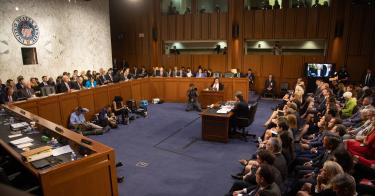It was an interesting way to start a confirmation hearing. Senate Judiciary Committee Democrats talked as though Supreme Court nominee Brett Kavanaugh had just beamed to earth from another planet or materialized out of thin air moments before the hearing began.
To hear them tell it, they’ve barely heard of Kavanaugh—a man this same committee confirmed as a U.S. circuit court judge 12 years ago. Yet now it seems they know nothing about him, and have no material or documents that could help them get up to speed about this mystery man.
It’s all a pose, of course.
Complaining about material the committee has not (yet) received obscures what is available. Members of the committee have now received more material from Kavanaugh’s legal record than the past five Supreme Court nominees combined. Kavanaugh himself appended more than 17,000 pages from his speeches and articles to his Judiciary Committee questionnaire. The committee has also been inundated with information about Kavanaugh’s non-judicial background and work experience.
If there’s a problem, it’s not that the Senate has too little material related to Kavanaugh’s professional record, but that the Senate needs a way to sort through it all.
Thankfully, guidance on how to do that was offered in 2009, when Senate Minority Leader Chuck Schumer, D-N.Y., and Sen. Patrick Leahy, D-Vt., served on the Judiciary Committee during Sonia Sotomayor’s confirmation to the Supreme Court. Like Kavanaugh is now, Sotomayor was then a judge on the U.S. Court of Appeals. At that time, both Schumer and Leahy noted that the most useful information for evaluating a Supreme Court nominee is his or her “record on the bench.”
Kavanaugh’s record on the bench includes nearly 700 opinions he authored or joined over the last 12 years. Every one of those opinions, spanning more than 10,000 pages, was publicly available before anyone even thought of nominating Kavanaugh. What have Senate Democrats been doing since the nomination?
Democrats also keep shifting the confirmation goalpost. Leahy, for example, insisted in his opening statement that the hearing should not happen at all until everyone has read Kavanaugh’s entire record. There’s a reason why he offered no justification for this new standard: it doesn’t make sense.
This is, after all, a confirmation “process,” and it has several steps. There’s the FBI background check and the Judiciary Committee questionnaire. There are one-on-one meetings with the nominee (65 senators and counting). After the hearing, the committee will debate and vote and, finally, the full Senate will consider the nomination. The hearing occupies just four of the nearly 80 days between Kavanaugh’s nomination and expected confirmation. Different senators will consider different information at different times. Some jumped right into the deep end at the beginning; others probably haven’t even paid much attention yet.
If the committee had to wait until the last straggler got fully up to speed, a single senator could bring the nomination process to a grinding halt. The notion that this one small piece of the process, the hearing, cannot occur until every last piece of the information has been consumed is nonsense, another arbitrary attempt at disrupting the nomination.
We already know that extra time and tons of new material would not be helpful because every Judiciary Committee Democrat has already announced opposition to Kavanaugh’s nomination. Some of these senators not only ignored Kavanaugh’s record before announcing opposition, they could not consider it because, like Schumer did, they said they would oppose any nominee from President Trump, no matter who it is.
Far from needing hundreds of thousands of additional pages of material just to hold a hearing, most Democrats needed only a single piece of information to decide how to vote on confirmation: the president who nominated Kavanaugh.
The Judiciary Committee has had, for quite a long time, the most relevant information concerning Judge Kavanaugh’s fitness for the Supreme Court. It also has an enormous (and growing) body of less relevant information.
The time between nomination and confirmation will be more than 25 percent longer for Kavanaugh than the average over the last three decades. Members of the Judiciary Committee interested in approaching the nomination with due diligence have had more than ample reading time and more than enough relevant reading material. At the end of this hearing and the subsequent debate, every senator will be able to make a fully informed and deliberate decision regarding the Kavanaugh nomination.
This piece originally appeared in The Washington Examiner



